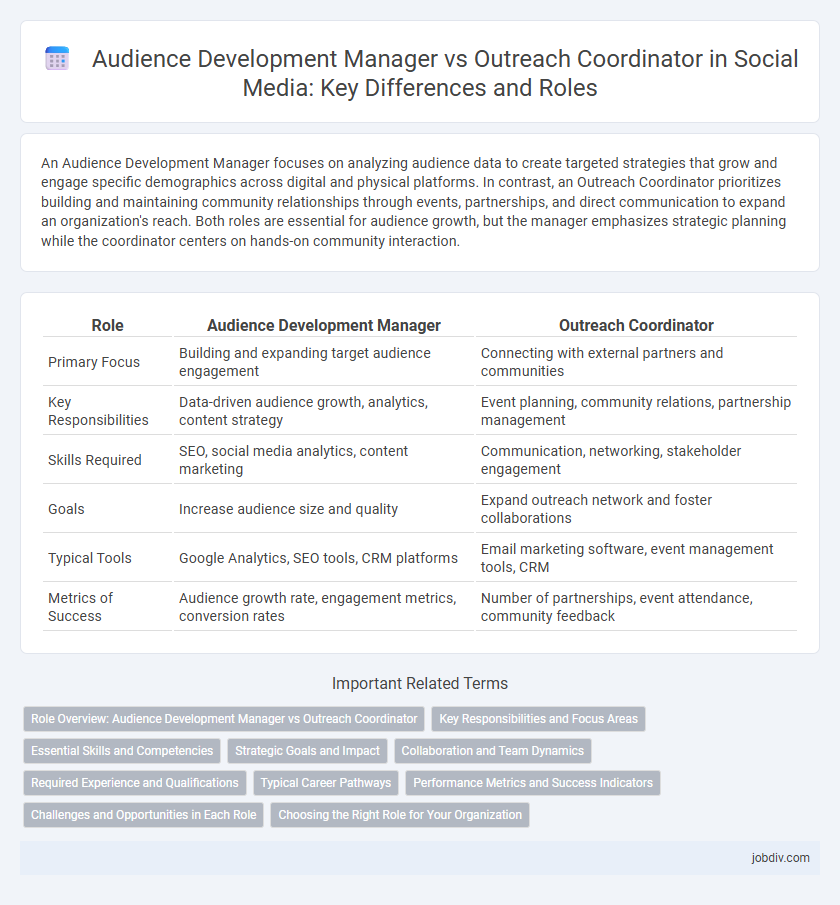An Audience Development Manager focuses on analyzing audience data to create targeted strategies that grow and engage specific demographics across digital and physical platforms. In contrast, an Outreach Coordinator prioritizes building and maintaining community relationships through events, partnerships, and direct communication to expand an organization's reach. Both roles are essential for audience growth, but the manager emphasizes strategic planning while the coordinator centers on hands-on community interaction.
Table of Comparison
| Role | Audience Development Manager | Outreach Coordinator |
|---|---|---|
| Primary Focus | Building and expanding target audience engagement | Connecting with external partners and communities |
| Key Responsibilities | Data-driven audience growth, analytics, content strategy | Event planning, community relations, partnership management |
| Skills Required | SEO, social media analytics, content marketing | Communication, networking, stakeholder engagement |
| Goals | Increase audience size and quality | Expand outreach network and foster collaborations |
| Typical Tools | Google Analytics, SEO tools, CRM platforms | Email marketing software, event management tools, CRM |
| Metrics of Success | Audience growth rate, engagement metrics, conversion rates | Number of partnerships, event attendance, community feedback |
Role Overview: Audience Development Manager vs Outreach Coordinator
An Audience Development Manager focuses on analyzing audience data and creating strategies to grow engagement and retention across digital platforms. An Outreach Coordinator specializes in building partnerships and fostering community relationships to promote events, programs, or initiatives. Both roles collaborate to expand reach but differ in strategic versus relational responsibilities.
Key Responsibilities and Focus Areas
An Audience Development Manager strategizes to grow and engage target demographics through data analysis, content optimization, and digital marketing campaigns. An Outreach Coordinator focuses on building relationships with community groups, partners, and stakeholders to increase program visibility and participation. While the manager prioritizes audience metrics and retention strategies, the coordinator emphasizes collaboration and network expansion for outreach effectiveness.
Essential Skills and Competencies
An Audience Development Manager excels in data analysis, strategic planning, and digital marketing to grow and engage target demographics effectively. In contrast, an Outreach Coordinator prioritizes relationship-building, communication, and event organization to foster community connections and partnerships. Both roles require strong interpersonal skills, but the Audience Development Manager focuses more on analytics-driven decision-making, whereas the Outreach Coordinator emphasizes direct engagement and collaboration.
Strategic Goals and Impact
An Audience Development Manager focuses on expanding and diversifying the target audience through data-driven strategies, using analytics to tailor content and optimize engagement across platforms. An Outreach Coordinator emphasizes community engagement by building partnerships and coordinating events to foster direct connections and enhance brand visibility. Both roles drive strategic goals by increasing reach and impact, but the manager prioritizes audience growth metrics while the coordinator centers on relational influence and grassroots involvement.
Collaboration and Team Dynamics
Audience Development Managers and Outreach Coordinators play distinct yet complementary roles in enhancing social engagement; the former focuses on data-driven strategies to expand reach and analyze audience behavior, while the latter emphasizes building relationships through direct community interaction and network cultivation. Collaboration between these roles maximizes team dynamics by combining analytical insights with on-the-ground outreach efforts, fostering a cohesive approach to audience growth. Effective teamwork requires clear communication channels and shared objectives to align marketing campaigns with outreach initiatives, ensuring consistent messaging across platforms.
Required Experience and Qualifications
Audience Development Managers require extensive experience in data analytics, digital marketing, and audience segmentation, typically holding degrees in marketing, communications, or related fields. Outreach Coordinators need strong interpersonal skills, event planning expertise, and often possess backgrounds in public relations, community engagement, or nonprofit management. Both roles demand excellent communication abilities, but the Audience Development Manager emphasizes strategic data-driven insights while the Outreach Coordinator prioritizes relationship building and grassroots outreach.
Typical Career Pathways
An Audience Development Manager often progresses from roles in marketing, analytics, or digital content strategy, advancing towards senior management positions such as Director of Marketing or Chief Marketing Officer by leveraging expertise in audience segmentation and engagement metrics. Outreach Coordinators typically begin in community relations, nonprofit program support, or grassroots activism, moving into roles like Community Engagement Manager or Public Relations Specialist by cultivating strong partnerships and expanding organizational reach. Both career pathways emphasize relationship-building and communication skills but diverge in strategic focus and organizational hierarchy trajectories.
Performance Metrics and Success Indicators
Audience Development Managers focus on performance metrics such as audience growth rates, engagement levels, and retention statistics to gauge campaign effectiveness and long-term impact. Outreach Coordinators prioritize success indicators like community participation numbers, stakeholder feedback, and event attendance to measure relationship-building and program reach. Both roles utilize data analytics tools and CRM systems to track progress and refine strategies based on quantitative and qualitative insights.
Challenges and Opportunities in Each Role
Audience Development Managers face challenges in data-driven strategy implementation and optimizing multi-channel engagement, while opportunities arise from leveraging advanced analytics and personalized content to boost audience growth. Outreach Coordinators encounter difficulties in building sustained community relationships and managing diverse stakeholder communications, with opportunities in expanding network reach and fostering meaningful partnerships for enhanced brand visibility. Both roles demand adaptive skills in audience targeting but differ in strategic focus and operational execution.
Choosing the Right Role for Your Organization
An Audience Development Manager focuses on growing and engaging target demographics through data-driven marketing strategies, optimizing content for maximum reach and retention. An Outreach Coordinator prioritizes building and maintaining community relationships, organizing events and partnerships to enhance visibility and support. Selecting the right role depends on whether your organization aims to expand audience size through strategic campaigns or strengthen community connections through personalized outreach.
Audience Development Manager vs Outreach Coordinator Infographic

 jobdiv.com
jobdiv.com